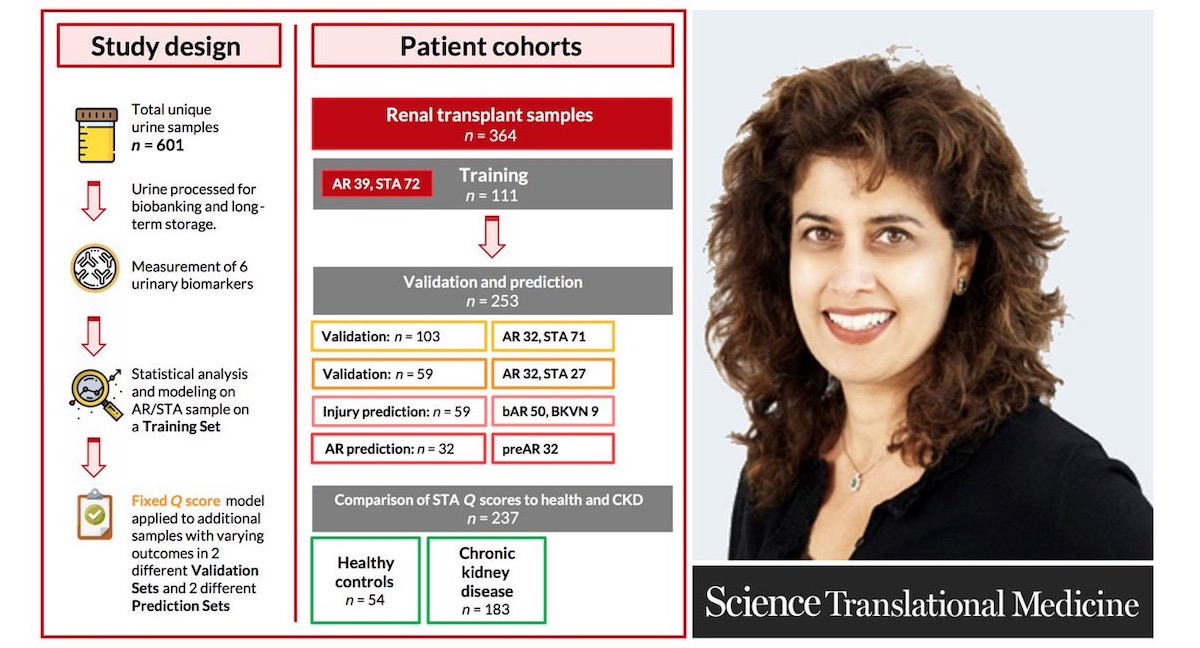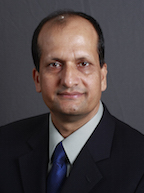
Minnie M. Sarwal M.D., Ph.D., FRCP, DCH
- Professor of Surgery, Medicine, Pediatrics Professor (Adj), Stanford University, UC Berkeley Director, Precision Transplant Medicine, UCSF Co-Director, T32 Training Grant, Transplant Surgery, UCSF
Contact Information
Education
La Martiniere, Calcutta, India, English Language and Literature, I.S.C.,1981
Calcutta Medical College, Calcutta, India, M.D.,1985
Diploma in Child Health (D.C.H.), London, UK, with distinction 1989
Cambridge University, U.K, Ph.D.,1995
Residencies
- Residency (Medicine and Surgery), Calcutta Medical College, India, 06/1986-06/1987
- Senior House Officer (Pediatrics and Surgery), Calcutta Medical College, India. Advisors: Sir Keith Peters, Sir Cyril Chantler and Sydney Brenner, 06/1987-02/1988
- Senior House Officer, General Pediatrics & Neonates, Good Hope Hospital, Sutton Coldfield, Birmingham, UK, 02/-07/1989
- Senior House Officer, General Pediatrics & Neonates, Grantham and Kesteven Hospital, Granthan (GKGH), UK, 03/1988-02/1989
- Senior House Officer, Neonatology, Leicester Royal Infirmary (LRI), Leicester, UK, 08/-11/1989
- Senior House Officer, General Pediatrics & Neonates, Leicester General Hosp. (LGH), Leicester, UK, 12/89- 03/90
- Registrar, Pediatric Cardiology and Cardiothoracic Surgical Unit, Groby Road Hospital, (GRH), Leicester, UK, 04/90-07/90
- Senior House Officer, Pediatric Nephrology Unit, Guy's Hospital, London, UK, 08/90-10/90
- Lecturer/Registrar, Pediatric Unit, Guy's Hospital, London, UK, 10/90-09/91
- Lecturer/Senior Registrar, Pediatric Nephrology, Dept. of Pediatrics, Guy's Hospital, London, U.K., 10/92-07/95
Clinical Expertise
- Acute Kidney Failure
- Chronic Kidney Disease
- Cystinosis
- End-Stage Renal Disease
- Kidney Transplant Clinical Trials
- Methylmalonic acidemia
- Oxalosis
- Pediatric Bone and Mineral Disorders
- Pediatric Kidney Transplantation
- Pediatric Transplant Nephrology
- Transplant Immunology
Research Interests
- Genomics
- Antibiomics
- GVHD
- Hepatitis B, C and HIV
- Metabolomics
- Organ diseases
- Proteomics
- Transplant immunobiology of rejection and tolerance
Foreign Languages Spoken
- Hindi, Punjab
Biography
Minnie M. Sarwal M.D., Ph.D., FRCP, DCH is Professor in Residence, Department of Surgery, Division of Transplant Surgery, Co-Director of the Pancreas Kidney Transplant Program, Director of the Precision Transplant Medicine, Sarwal Lab at UCSF. Sarwal is a nationally and internationally recognized leader in the fields of renal and transplant medicine, genomics, proteomics and immunology. The Sarwal Lab supported precision and predictive diagnostic and therapeutic approaches for organ transplant recipients by discovering new treatments and investigative approaches using in vitro, CRISPR-Cas9, and animal KO models relevant to kidney disease, FSGS and transplant rejection. Sarwal was Professor of Surgery, Pediatrics and Immunology at Stanford University, Medical Director of the Pediatric Kidney Transplant Program at Lucille Packard Children's Hospital and Director of the Sarwal Lab for 16 years prior to joining UCSF in 2014.
Sarwal received her M.D. from Calcutta Medical College in India, completed her residency in the UK, and a fellowship in Pediatric Nephrology at Guy's Hospital, London, UK. She earned her Ph.D. in Molecular Genetics from Cambridge University (Christ's College) where she worked with Nobel Laureate Sydney Brenner on the synthetic mapping of human and puffer fish G proteins. Sarwal also holds a Diploma in Child Health from London, UK, and degrees from the Royal College of Physicians, UK (MRCP) and is an elected Fellow of the Royal College of Physicians, UK in recognition of her outstanding contributions to the field of medicine. Sarwal is a member of numerous national and international societies including the ASN, IPTA, AST, TTS, and IPNA. She is Chief Editor, Frontiers in Nephrology (a nature journal), AE for Clinical Transplantation and has published in and served as AE/reviewer for many other scientific journals inclusive of the Nature Medicine, NEJM, AJT, Nature Communications, PNAS, Journal of Immunology and Journal of Experimental Medicine.
Sarwal has also been the recipient of numerous awards and distinctions, including the Order of Excellence in Scientific Research (Cambridge, UK, 2002), the Dean's Teaching Award (2005), the Junior Faculty Award from the CCIS (2003-6), recognized Key Opinion Leader in Organ Transplantation by the Transplantation Society (2007-2009), elected Senator at Large for the Stanford Faculty Senate (2005-10), Faculty Senate UCSF (2015-17), the TTS-Roche Award for Outstanding Achievement Transplantation Science (Clinical; 2010), and the Cunio Richardson NKF Award for Scientific Excellence (2012). She also serves on the FDA Science Board for her third term, and is current Chair of the NIH-SBIR review study section and is Chair of the Department of Defense, Tissue Transplantation section. She is also a successful entrepreneur scientist and a founding member of the Rosenman Institute at UCSF.
Awards & Honors
Research Overview
As principal Investigator on numerous multicenter clinical trials, both industry and institutional, Sarwal has developed extensive expertise in the design and execution of clinical studies. While at Stanford, Sarwal conducted the first successful U.S. steroid avoidance trial and the first dosing safety trial for Rituximab in pediatric renal transplantation.
In 2009, Sarwal founded, Organ-i, a Stanford University spin-out to develop and commercialize her pioneering work. Organ-i leveraged 15 years of research and over $20M in NIH grants. The company's goal is to improve the clinical management of transplant patients globally by commericializing non-invasive tests to monitor and predict organ health for transplant recipients.
Sarwal is credited with the introduction of (k-SORT), a Kidney Solid Organ Rejection Test, the company's lead product, as well as a pipeline of molecular assays focused on post-transplant rejection monitoring and allograft tolerance. In June 2014. Immucor, Inc., a global leader in transfusion and transplantation diagnostics, announced the acquisition of Organ-i and retained Sarwal as a scientific advisory role to advance the Organ-i pipeline.
Research & Funding
- Mapping Immune Responses to CMV in Renal Transplant RecipientsSponsor: NIH/NIAIDSponsor ID: U19AI128913Funding Period:Aug 2017-Jul 2022Co-Principal Investigator
- CD40 autoantibody and FSGS recurrenceSponsor: NIH/NIDDKSponsor ID: R01DK109720Funding Period:Apr 2017-Mar 2022Principal Investigator
- Filling a Void of Research (FAVOR) Training for Transplant SurgeonsSponsor: NIH/NIAIDSponsor ID: T32AI125222Funding Period:Aug 2016-Jul 2021Co-Principal Investigator
- Drug Repositioning in Diabetic NephropathySponsor: NIH/NCATSSponsor ID: R21TR001761Funding Period:Sep 2016-Jul 2019Principal Investigator
- Transplant injury biology and monitoring by urine proteomicsSponsor: NIH/NIDDKSponsor ID: R56DK083447Funding Period:Jul 2009-Aug 2016Principal Investigator
- Urinary Proteome Monitoring for Transplant InjurySponsor: NIH/NIDDKSponsor ID: R01DK083447Funding Period:Aug 2010-Jul 2015Principal Investigator
- Gene and Cytokine Expression in Tolerance and GVHDSponsor: NIH/NIAIDSponsor ID: R01AI085024Funding Period:Sep 2009-Aug 2014Co-Principal Investigator
- A Proteomics Research Resource for Integrative BiologySponsor: NIHSponsor ID: P41RR018522Funding Period:Sep 2003-Jun 2013Co-Investigator
- General Clinical Research CenterSponsor: NIHSponsor ID: M01RR000070Funding Period:Dec 1978-Nov 2011Co-Investigator
- Novel Urinary Proteomic Biomarkers for Acute Renal Transplant RejectionSponsor: NIH/NIAIDSponsor ID: R21AI075256Funding Period:Jun 2009-May 2011Principal Investigator
- Defining Biomarkers in Pediatric Renal TransplantationSponsor: NIH/NIAIDSponsor ID: R01AI061739Funding Period:Jun 2004-May 2009Principal Investigator
Clinical Trials
- Study ID: NCT04705766Start Date: Jan 2021Estimated Completion Date: Jan 2022Condition(s): COVID-19, Acute Kidney Injury, Kidney Injury
Publications
MOST RECENT PUBLICATIONS FROM A TOTAL OF 255
- Roufosse C, Naesens M, Haas M, Lefaucheur C, Mannon RB, Afrouzian M, Alachkar N, Aubert O, Bagnasco SM, Batal I, Bellamy COC, Broecker V, Budde K, Clahsen-Van Groningen M, Coley SM, Cornell LD, Dadhania D, Demetris AJ, Einecke G, Farris AB, Fogo AB, Friedewald J, Gibson IW, Horsfield C, Huang E, Husain SA, Jackson AM, Kers J, Kikic Ž, Klein A, Kozakowski N, Liapis H, Mangiola M, Montgomery RA, Nankinvell B, Neil DAH, Nickerson P, Rabant M, Randhawa P, Riella LV, Rosales I, Royal V, Sapir-Pichhadze R, Sarder P, Sarwal M, Schinstock C, Stegall M, Solez K, van der Laak J, Wiebe C, Colvin RB, Loupy A, Mengel M. The Banff 2022 Kidney Meeting Work Plan: Data-driven Refinement of the Banff Classification for Renal Allografts. Am J Transplant. 2023 Nov 04. View in PubMed
- Sigdel TK, Sur S, Boada P, McDermott SM, Arlehamn CSL, Murray KO, Bockenstedt LK, Kerwin M, Reed EF, Harris E, Stuart K, Peters B, Sesma A, Montgomery RR, Sarwal MM. Proteome Analysis for Inflammation Related to Acute and Convalescent Infection. Inflammation. 2023 Oct 13. View in PubMed
- Sarwal MM, Naesens M. Urine trumps the protocol biopsy for subclinical rejection surveillance. Kidney Int. 2023 09; 104(3):432-439. View in PubMed
- Lamarthée B, Callemeyn J, Van Herck Y, Antoranz A, Anglicheau D, Boada P, Becker JU, Debyser T, De Smet F, De Vusser K, Eloudzeri M, Franken A, Gwinner W, Koshy P, Kuypers D, Lambrechts D, Marquet P, Mathias V, Rabant M, Sarwal MM, Senev A, Sigdel TK, Sprangers B, Thaunat O, Tinel C, Van Brussel T, Van Craenenbroeck A, Van Loon E, Vaulet T, Bosisio F, Naesens M. Transcriptional and spatial profiling of the kidney allograft unravels a central role for FcyRIII+ innate immune cells in rejection. Nat Commun. 2023 07 19; 14(1):4359. View in PubMed
- Sigdel TK, Boada P, Kerwin M, Rashmi P, Gjertson D, Rossetti M, Sur S, Munar D, Cimino J, Ahn R, Pickering H, Sen S, Parmar R, Fatou B, Steen H, Schaenman J, Bunnapradist S, Reed EF, Sarwal MM, CMV Systems Immunobiology Group. Plasma proteome perturbation for CMV DNAemia in kidney transplantation. PLoS One. 2023; 18(5):e0285870. View in PubMed
- View All Publications
In the News
- UCSF Department of Surgery - February 22, 2023Minnie Sarwal, MD, PhD and Swas Sur Awarded 2023 Kunal Patel Catalyst Award for Novel Renoprotective Drug Target Discovery in an Established Renal Tubular Injury Model Minnie Sarwal, MD, PhD and Swas Sur Awarded 2023 Kunal Patel Catalyst Award Catalyst Awards are the centerpiece of the Catalyst Program. UCSF principal investigators with promising early-stage research projects designed for patient benefit and with commercial potential spanning therapeutics, diagnostics, medical devices, [...]

- UCSF News Services - Scott Maier - April 06, 2020Noninvasive Test More Than 95 Percent Accurate, UCSF Researchers Say A simple urine test can diagnose and predict acute rejection in kidney transplants, leading to an opportunity for earlier detection and treatment, according to a new study by researchers at UC San Francisco. A test of 601 urine samples showed greater than 95 percent accuracy in determining the risk of rejection following transplant, the researchers said. Their work already has led to the spinoff Bay Area company NephroSant, [...]

- Sarwal Lab - Richard Barg - June 24, 2019Today, the Chan Zuckerberg Initiative (CZI) announced $68 million in funding to support the Human Cell Atlas and its selection of 38 collaborative science teams to launch CZI's Seed Networks for a Human Cell Atlas projects. These collaborative groups bring together scientists, computational biologists, software engineers, and physicians to support the continued development of the Human Cell Atlas (HCA), an international effort to map all cells in the human body. Minnie M. Sarwal M.D., Ph.D., [...]

- Sarwal Lab - Scott Maier - April 14, 2019UCSF Researchers Recommend Creation of National Donor Registry While organ transplant recipients receive continual care as the end-stage treatment to their condition, attention also should be given to living donors, who can suffer from hypertension, diabetes and other disorders after donation, according to a study by researchers at UC San Francisco. As reported online April 12, 2019, in JAMA Network Open, by aggregating data from publicly available clinical studies, the researchers found [...]

- Sarwal Lab - Richard Barg - October 03, 2017UCLA, UCSF and City of Hope have received a five-year, $8 million grant from the National Institute of Allergy and Infectious Diseases to study how a common virus called cytomegalovirus may provoke the immune system to reject transplanted kidneys. Minnie M. Sarwal M.D., Ph.D., FRCP, DCH, professor and director of Precision Transplant Medicine in the UCSF Department of Surgery, is co-leader and principal investigator on the grant, which will investigate how a common virus called cytomegalovirus [...]

- UCSF Department of Surgery - Richard Barg - January 06, 2017The NIH has awarded the UCSF Department of Surgery a T32 training grant, "Filling a Void of Research Training for Transplant Surgeons" (FAVOR). The grant, awarded in August 2016, provides annual funding in the amount of $156,602 for in-depth training of three general surgery residents with an interest in transplant surgery during their two research years, the training to be focused on translational immunology. The program is led by Professors Peter G. Stock, M.D., Ph.D. and Minnie M. Sarwal [...]


- Sarwal Lab - August 03, 2016Natera, a genetic testing and diagnostics company with proprietary bioinformatics and molecular technology, has announced that it has formed a collaboration with the Sarwal Lab at University of California San Francisco to study DNA markers of kidney transplant rejection.The Sarwal Lab has been focused on using precision medicine techniques to better diagnose and predict acute rejection (AR) in kidney transplants, a finding that eventually could replace the need for biopsies and lead to earlier [...]


- Sarwal Lab - Richard Barg - February 17, 2016Joshua Y. Yang, B.S., Michael C. Nasr, B.S., and Tyler Schmeckpeper B.S., Master of Translational Medicine (MTM), graduate student researchers in the Sarwal Lab, were recently invited to attend the 9th annual Clinton Global Initiative University (CGI U) 2016 at UC Berkeley on April 1-3, 2016, and selected as presenters to disucss their work. The MTM program, a cross-campus collaboration between two University of California campuses—San Francisco and Berkeley, and launched with the help of [...]

- Sarwal Lab - Richard Barg - October 25, 2015Minnie M. Sarwal M.D., Ph.D., FRCP, DCH will speak at the 10th annual PMWC Conference in San Francisco that runs from January 24 - 27, 2016. Her talk will be on the use of molecular diagnostics in organ transplantation to better detect rejection, and improving the management of transplant patients through proactively to preserve organ function. Dr. Sarwal has over 30 years of clinical experience and 25 years of research experience in translational immunogenetics, genomics, proteomics and [...]

- Sarwal Lab - Richard Barg - March 25, 2015International Innovation, an online forum for the communication and dissemination of cutting-edge research, recently reported on the pioneering efforts of the Sarwal Lab to develop novel translational approaches for improving the management of kidney transplant patients and treating renal disease. The article reports on the lab's breakthrough assays, the kidney solid organ rejection test (kSORT) and the kidney spontaneous operational tolerance test (kSPOT), and their potential [...]

- Sarwal Lab - December 15, 2014Nature Reviews Nephrology recently reported on the Sarwal Lab's research elucidating the role of AECAs in graft rejection: Evidence from clinical studies has implicated non-HLA anti-endothelial cell antibodies (AECAs) in transplant rejection. However, the pathogenic mechanisms by whch these antibodies might contribute to renal allograft dysfunction are not well understood. Now, new data from Annette Jackson, Minnie Sarwal (pictured right) and colleagues suggest that AECAs activate the vascular [...]

- Sarwal Lab - December 01, 2014UCSF News reports on research led by Minnie Sarwal, MD, PhD, Director of the Sarwal Lab, in developing a test for diagnosing and predicting acute rejection (AR) in kidney transplants, a finding that eventually could replace the need for biopsies and lead to earlier detection of AR and treatment. 'We have found a set of genes in blood that pick up inflammation and acute rejection in different solid organ transplants and thus can replace the need for an invasive biopsy in the future,' said [...]


- Sarwal Lab - October 06, 2014UCSF News recently reported on research of the Sarwal Lab demonstrating pre-transplant antibody levels were associated with recurrence of FSGS. Researchers at UC San Francisco and Rush University Medical Center, Chicago, may have found a predictor for a disorder affecting kidney transplant recipients that can accelerate organ failure, a discovery that eventually could allow for customized therapies and improved patient selection for transplant. The study of focal segmental glomerulosclerosis [...]

- Sarwal Lab - August 08, 2014Minnie M. Sarwal M.D., Ph.D., FRCP, DCH has been elected as a member of the Council of The Transplantation Society. The Transplantation Society is an organization that serves as an international forum professionals working in the field of organ transplantation. Currently it has 6500+ members spanning across 101 countries across the globe.

- Sarwal Lab - January 29, 2013Dr. Minnie Sarwal discusses the omics approach to transplant monitoring and the potential use of sensitive and effective biomarkers for diagnosiing and treating disease. Rapid progress in high throughput molecular screening and in bioinformatics tools have provided the scientific community with new tools for conducting basic and clinical research.

